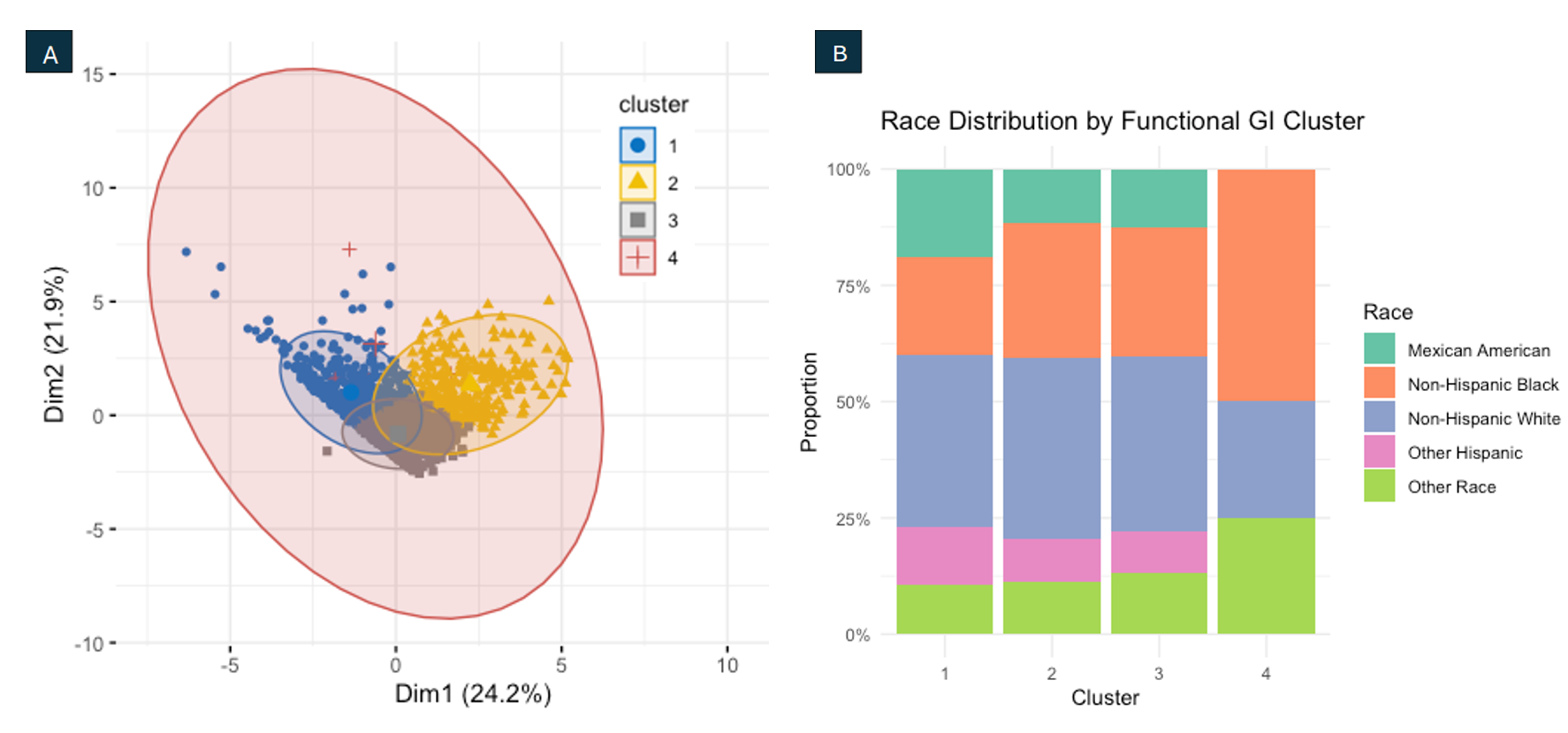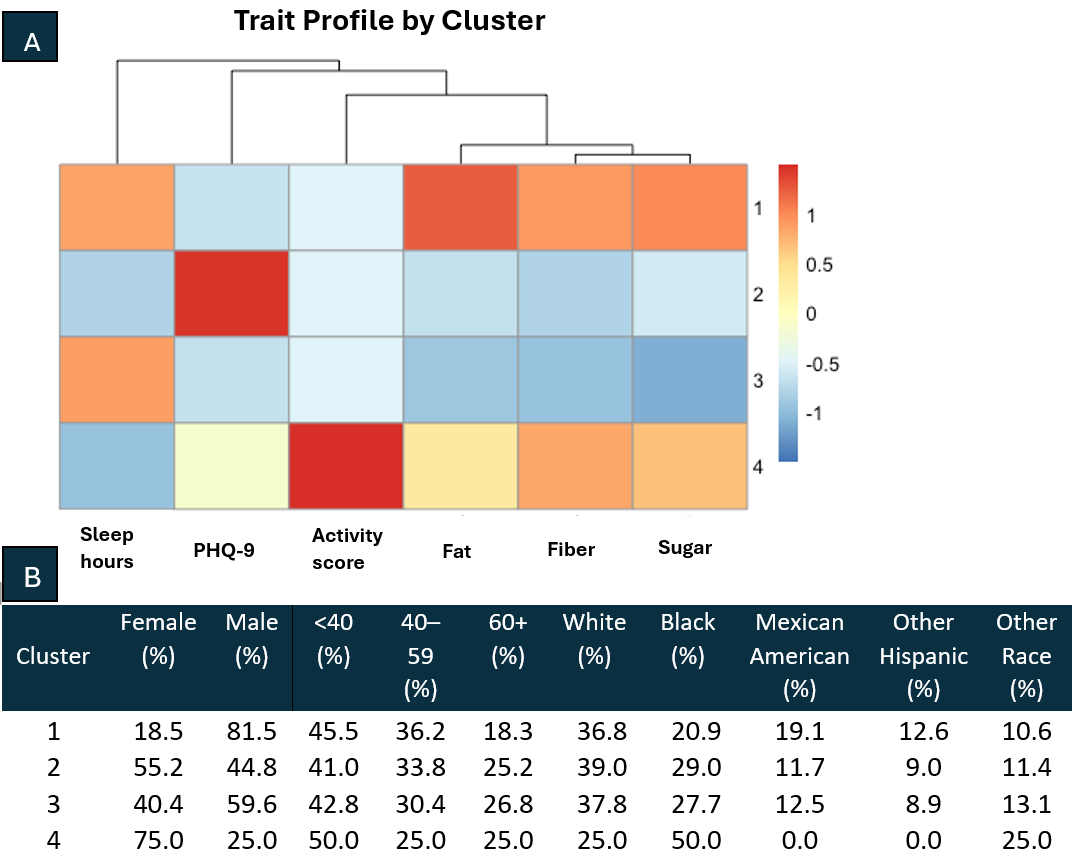Monday Poster Session
Category: Functional Bowel Disease
P2942 - Unsupervised Clustering of Functional Gastrointestinal Disorders in NHANES Reveals Novel Mood–Diet–Symptom Phenotypes by Race and Sex
Monday, October 27, 2025
10:30 AM - 4:00 PM PDT
Location: Exhibit Hall

Nikita Garg, MD (she/her/hers)
Geisinger Wyoming Valley Medical Center
Wilkes-Barre, PA
Presenting Author(s)
Nikita Garg, MD1, Justin-James Chua, MD2, Varun Jain, MD2, Tushar Abhinav, MD3, Shruthi Sethuraman, MD2, Paarth Kapadia, MD2, Nanditha Venkatesan, MD4, Adriana L. Cifuentes De La Torre, MD2
1Geisinger Wyoming Valley Medical Center, Wilkes-Barre, PA; 2University of Pittsburgh Medical Center, Pittsburgh, PA; 3The Wright Center for Graduate Medical Education, Wilkes-Barre, PA; 4University of Pittsburgh, Pittsburgh, PA
Introduction: Functional gastrointestinal (GI) disorders like irritable bowel syndrome (IBS) are heterogeneous, yet existing subtypes fail to capture the complex interplay of diet, psychology, and behavior. We applied unsupervised machine learning to identify data-driven GI phenotypes based on lifestyle and psychological features and assessed their distribution across sex and race.
Methods: We analyzed data from adults in the 2017–2018 NHANES cycle with complete information on bowel symptoms, pain, depression, dietary intake (fat, fiber, sugar), sleep, and physical activity. Bowel symptoms were assessed using the Bowel Health Questionnaire, while depression was measured with the Patient Health Questionnaire-9 (PHQ-9). Dietary intake was evaluated via two 24-hour dietary recalls conducted by trained interviewers using the USDA’s Automated Multiple-Pass Method; reported foods were linked to nutrient values through the USDA Food and Nutrient Database for Dietary Studies. Sleep was self-reported via validated questionnaire, and physical activity was captured using the Physical Activity Questionnaire. All features were standardized and subjected to K-means clustering. Trait and demographic patterns were visualized using heatmaps and principal component analysis.
Results: Among 1,965 adults, four distinct clusters emerged. The elbow plot suggested diminishing returns beyond K=4, while the silhouette plot peaked at K=2 but remained stable at K=4, supporting a balance of separation and granularity. Cluster 1 (n=530) was predominantly male and younger, with low symptom burden despite high-fat/sugar intake. Cluster 2 (n=290) was predominantly female, with highest PHQ-9 and pain scores, low fiber intake, and poor sleep, with the highest proportion of Non-Hispanic Black participants (29%). Cluster 3 (n=1,141) had moderate symptoms and healthier behaviors. Heatmaps revealed distinct psychological-dietary profiles by cluster, highlighting underappreciated heterogeneity in symptom expression across race and sex. Cluster 4 (n=4) was excluded from final comparisons.
Discussion: Unsupervised clustering revealed novel functional GI phenotypes that integrate psychological and lifestyle traits, offering a more comprehensive framework than current classifications. These clusters varied significantly by sex and race, underscoring the need for more inclusive diagnostic criteria and targeted interventions. Future studies should validate these findings in clinical cohorts and explore their utility in guiding personalized care.

Figure: Figure.1 (A) K-means clustering of functional GI phenotypes; (B) Stacked bar plot showing the racial distribution across the four identified GI phenotype clusters.

Figure: Figure.2 (A) Cluster trait heatmap with warmer colors indicating higher values relative to the population mean. (B) Table summarizing demographic characteristics by cluster, including sex, age distribution, and racial/ethnic composition.
Disclosures:
Nikita Garg indicated no relevant financial relationships.
Justin-James Chua indicated no relevant financial relationships.
Varun Jain indicated no relevant financial relationships.
Tushar Abhinav indicated no relevant financial relationships.
Shruthi Sethuraman indicated no relevant financial relationships.
Paarth Kapadia indicated no relevant financial relationships.
Nanditha Venkatesan indicated no relevant financial relationships.
Adriana L. Cifuentes De La Torre indicated no relevant financial relationships.
Nikita Garg, MD1, Justin-James Chua, MD2, Varun Jain, MD2, Tushar Abhinav, MD3, Shruthi Sethuraman, MD2, Paarth Kapadia, MD2, Nanditha Venkatesan, MD4, Adriana L. Cifuentes De La Torre, MD2. P2942 - Unsupervised Clustering of Functional Gastrointestinal Disorders in NHANES Reveals Novel Mood–Diet–Symptom Phenotypes by Race and Sex, ACG 2025 Annual Scientific Meeting Abstracts. Phoenix, AZ: American College of Gastroenterology.
1Geisinger Wyoming Valley Medical Center, Wilkes-Barre, PA; 2University of Pittsburgh Medical Center, Pittsburgh, PA; 3The Wright Center for Graduate Medical Education, Wilkes-Barre, PA; 4University of Pittsburgh, Pittsburgh, PA
Introduction: Functional gastrointestinal (GI) disorders like irritable bowel syndrome (IBS) are heterogeneous, yet existing subtypes fail to capture the complex interplay of diet, psychology, and behavior. We applied unsupervised machine learning to identify data-driven GI phenotypes based on lifestyle and psychological features and assessed their distribution across sex and race.
Methods: We analyzed data from adults in the 2017–2018 NHANES cycle with complete information on bowel symptoms, pain, depression, dietary intake (fat, fiber, sugar), sleep, and physical activity. Bowel symptoms were assessed using the Bowel Health Questionnaire, while depression was measured with the Patient Health Questionnaire-9 (PHQ-9). Dietary intake was evaluated via two 24-hour dietary recalls conducted by trained interviewers using the USDA’s Automated Multiple-Pass Method; reported foods were linked to nutrient values through the USDA Food and Nutrient Database for Dietary Studies. Sleep was self-reported via validated questionnaire, and physical activity was captured using the Physical Activity Questionnaire. All features were standardized and subjected to K-means clustering. Trait and demographic patterns were visualized using heatmaps and principal component analysis.
Results: Among 1,965 adults, four distinct clusters emerged. The elbow plot suggested diminishing returns beyond K=4, while the silhouette plot peaked at K=2 but remained stable at K=4, supporting a balance of separation and granularity. Cluster 1 (n=530) was predominantly male and younger, with low symptom burden despite high-fat/sugar intake. Cluster 2 (n=290) was predominantly female, with highest PHQ-9 and pain scores, low fiber intake, and poor sleep, with the highest proportion of Non-Hispanic Black participants (29%). Cluster 3 (n=1,141) had moderate symptoms and healthier behaviors. Heatmaps revealed distinct psychological-dietary profiles by cluster, highlighting underappreciated heterogeneity in symptom expression across race and sex. Cluster 4 (n=4) was excluded from final comparisons.
Discussion: Unsupervised clustering revealed novel functional GI phenotypes that integrate psychological and lifestyle traits, offering a more comprehensive framework than current classifications. These clusters varied significantly by sex and race, underscoring the need for more inclusive diagnostic criteria and targeted interventions. Future studies should validate these findings in clinical cohorts and explore their utility in guiding personalized care.

Figure: Figure.1 (A) K-means clustering of functional GI phenotypes; (B) Stacked bar plot showing the racial distribution across the four identified GI phenotype clusters.

Figure: Figure.2 (A) Cluster trait heatmap with warmer colors indicating higher values relative to the population mean. (B) Table summarizing demographic characteristics by cluster, including sex, age distribution, and racial/ethnic composition.
Disclosures:
Nikita Garg indicated no relevant financial relationships.
Justin-James Chua indicated no relevant financial relationships.
Varun Jain indicated no relevant financial relationships.
Tushar Abhinav indicated no relevant financial relationships.
Shruthi Sethuraman indicated no relevant financial relationships.
Paarth Kapadia indicated no relevant financial relationships.
Nanditha Venkatesan indicated no relevant financial relationships.
Adriana L. Cifuentes De La Torre indicated no relevant financial relationships.
Nikita Garg, MD1, Justin-James Chua, MD2, Varun Jain, MD2, Tushar Abhinav, MD3, Shruthi Sethuraman, MD2, Paarth Kapadia, MD2, Nanditha Venkatesan, MD4, Adriana L. Cifuentes De La Torre, MD2. P2942 - Unsupervised Clustering of Functional Gastrointestinal Disorders in NHANES Reveals Novel Mood–Diet–Symptom Phenotypes by Race and Sex, ACG 2025 Annual Scientific Meeting Abstracts. Phoenix, AZ: American College of Gastroenterology.
